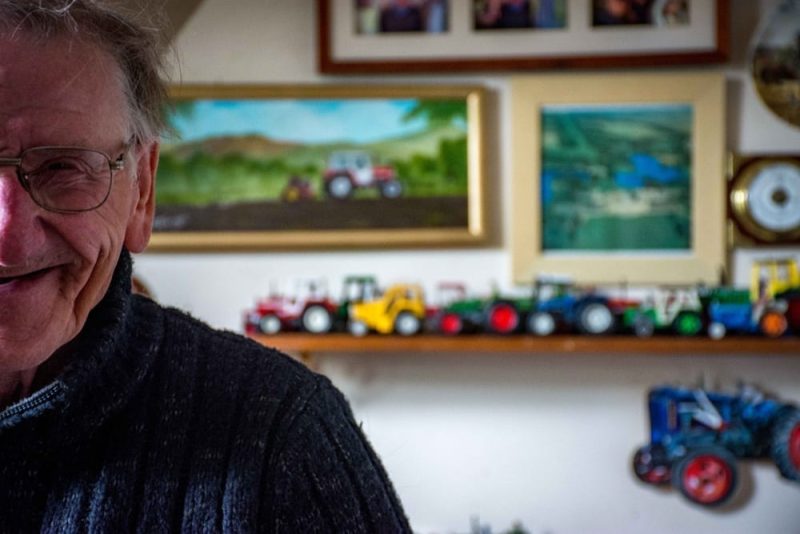Our Work
Homelessness and Housing
Our origins are in homelessness and housing, and we've continued to help tackle the issue since we began providing floating support in Oxfordshire in 1995.
Today, our work in this area extends across Buckinghamshire, Milton Keynes and Oxfordshire, with half of our services focussed on solving the issue.

We are proud to still deliver this original service, now known as our Housing Support Service. By developing tailored support plans that are unique to our clients' needs, our Support Workers provide help and guidance that enable our clients to maintain their tenancies. Our dedicated staff team have over 90 years of experience between them, and this combined expertise helped them successfully navigate their way through a reduction in funding this financial year, without seeing a dip in the quality of service that we are known for. Despite the additional pressures felt from this reduction, we successfully supported close to 400 households in avoiding homelessness in over 97% of cases.
We continued to identify rough sleepers across the different Oxfordshire districts through our Outreach service and we successfully supported 118 clients. At the start of the financial year, these services became part of the Oxfordshire Homelessness Alliance (OHA).
Other housing-led approaches include the Housing First model, an evidence-based approach that provides a home first, followed by personalised support to enable individuals with a history of entrenched or repeat homelessness to begin their recovery. It supports those with the highest and most complex needs, and over the course of the year, our Milton Keynes service, which is the fourth largest Housing First service in the country and the largest outside of Government pilots, was able to support 30 new clients.
By working collaboratively with Milton Keynes City Council's rent team to establish better methods of communication, we have been able to help most of our Housing First clients get out of debt or put payment plans in place to reduce their debt. We ran our Next Steps Accommodation service across Milton Keynes too, providing placements for people with lower-level support needs who were previously homeless. This year, the service put provisions in place to work with 32 new clients.
Our Adult Homeless Pathway service supported clients across Oxfordshire by providing 83 rooms in shared accommodation throughout Oxford, Witney, and Banbury. As part of our commitment to delivering person-centred support, we identified several clients who had come to us in 2020 as part of the COVID-19 influx, and, as a result of their increasing complex needs, we adapted our service to support them for longer than usual. By the end of the financial year, we successfully helped 29 people move on from the pathway, complete with 12 weeks of resettlement support to help their transition to independence.
"Step Down Housing is performing well against national benchmarks for reducing A&E attendances and emergency admissions." Kings College London
Our Step Down Housing service prevents homelessness by providing short-term housing for vulnerable patients who are medically ready to be discharged from hospitals in Oxfordshire, but lack suitable accommodation to continue their recovery.
Without this service, patients would remain in hospital beds unnecessarily or potentially be forced into rough sleeping. We place Embedded Housing Workers (EHWs) in all Oxfordshire hospitals not only to upskill medical staff and social workers on the complexities of housing these patients, but to provide direct support to patients in this situation.
After the pandemic, the need for this service grew - so much so that we successfully secured funding to increase our provision by four additional beds. Through hard work and dedication, the staff team were able to source, secure and furnish a new house within a matter of weeks, enabling them to welcome two guests straight away - guests who otherwise would have been homeless upon their discharge from hospital.
The additional beds were filled within days of opening the new house, highlighting the evident need for the extra capacity. The importance of this service was also recognised when we were successfully shortlisted for the Homeless Link Excellence Awards 2022 in the 'Prevention into Action' category. This particular award celebrated services committed to preventing homelessness (or repeated periods of rough sleeping) from happening.
As part of the Rough Sleeper Initiative in Buckinghamshire, we support former rough sleepers, providing them with life skills so they can live independently in their own rented home. Through wrap-around tenancy sustainment support, alongside help with mental health, budgeting, and general daily living, we empowered 110 clients to move on from this service, and we had a 100% tenancy sustainment rate. Our Rough Sleeper Outreach team continued to locate and verify rough sleepers across the county; 97 of whom found permanent housing after being accommodated in our emergency beds whilst accessing our intensive support.
"The Support Worker's emotional intelligence in the situation was absolutely brilliant, and she really made a difference... I [the researcher] walked away from the legal visit incredibly impressed with the sincerity and tactfulness of today's conversation -- the balance between professionalism and empathy was carefully employed and likely helped the client more than she even realises." Researcher, University of Oxford
Following the results of a recent independent review of the criminal justice system in Thames Valley, several learnings and recommendations were made by the Police & Crime Commissioner to reduce reoffending. One of which was the introduction of a pilot project, ‘Restart Thames Valley’ – initially a year-long programme aiming to work with more than 350 offenders leaving Bullingdon Prison in Oxfordshire and Bronzefield Prison in Surrey. This year, in partnership with Aspire Oxfordshire, Browns Community Services, Parents And Children Together (PACT) and Thames Valley Partnership, we began delivering the service to help those leaving prison build successful lives. The service supports clients for up to six months before and up to six months after release to help prevent reoffending and increase the chance of successfully reintegrating into society. By engaging with clients early on and before their release, we were able to help them achieve a better outcome upon their release, and we successfully supported 60 clients over the year.
Our work with ex-offenders in Buckinghamshire has gone from strength to strength this year, and we successfully secured additional funding, enabling us to continue delivering our RESET service. Since April 2022, the project has successfully assisted 54 people into sustainable accommodation, supporting them to make positive choices to enable a fresh start.
Case Study
David - 250 toy tractors but just one bag of food
David came to us for support when he found himself in arrears and was facing eviction.
Paul, one of our Support Workers, visited David at his home to undertake an initial assessment. David looked visibly underweight, which raised the alarm about his wellbeing. He confided that he’d spent all his money on his 250-strong collection of toy tractor tractors, leaving only enough for one bag of pasta in the cupboard.

Thankfully, Paul was able to source food vouchers so that David could stock up on necessities.
The next step was for them to look at David’s finances together. Then, alarm bells rang: David’s pension payments were entering his account and being withdrawn almost immediately. Paul began to suspect that David had fallen victim to financial abuse, and so, with David’s permission, they went to the bank to understand what was happening. Paul’s suspicions were confirmed when David shared that two people had been taking his money, leaving him with nothing. With David’s consent, Paul worked with the bank to implement some safeguarding measures to try and stop this from happening in the future. One such measure was for the bank to call Paul should David visit the bank without him, giving Paul a chance to check that David wasn’t being coerced into withdrawing money.
It wasn’t long before Paul received a call from the bank. David was there with another individual, wanting to withdraw money. The bank passed the phone to David, who asked Paul to meet him at the bank. Staff confirmed that the person with David was the same individual who had been with him many other times, encouraging him to withdraw large amounts. Paul discreetly asked David whether this person was a friend, to which David just looked away. Paul told the individual that David would no longer require her assistance and requested that she have no further contact with him.
After this encounter, David opened up about the financial abuse and how he felt threatened by this woman. He consented to Paul raising a safeguarding concern and was happy for the police to be involved. Paul identified additional safeguarding measures, like asking the landlord to ask the other tenants to refrain from letting anyone in the house, to further protect David in his home and limit any additional abuse.
Since meeting Paul and having the various measures put in place, there have been no new incidents of financial abuse, and David is now feeling safer in his own home.
